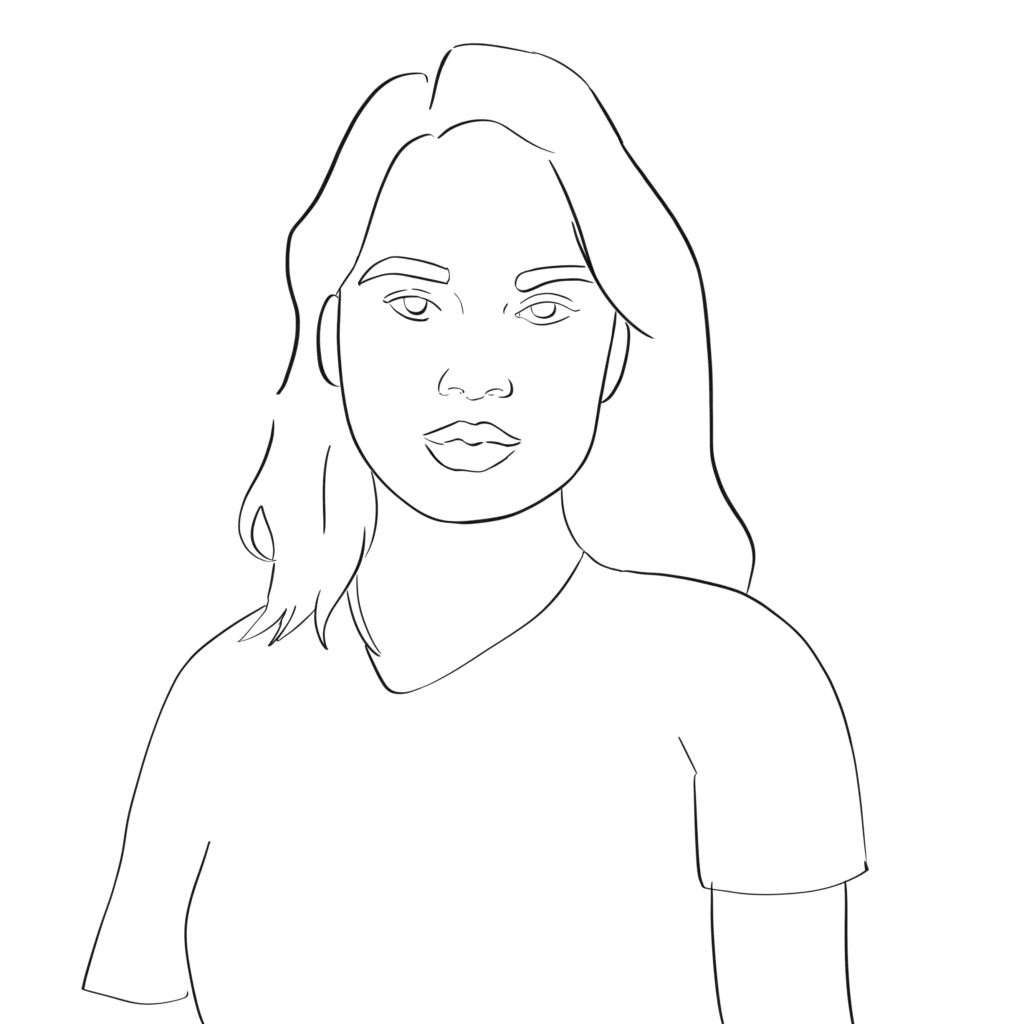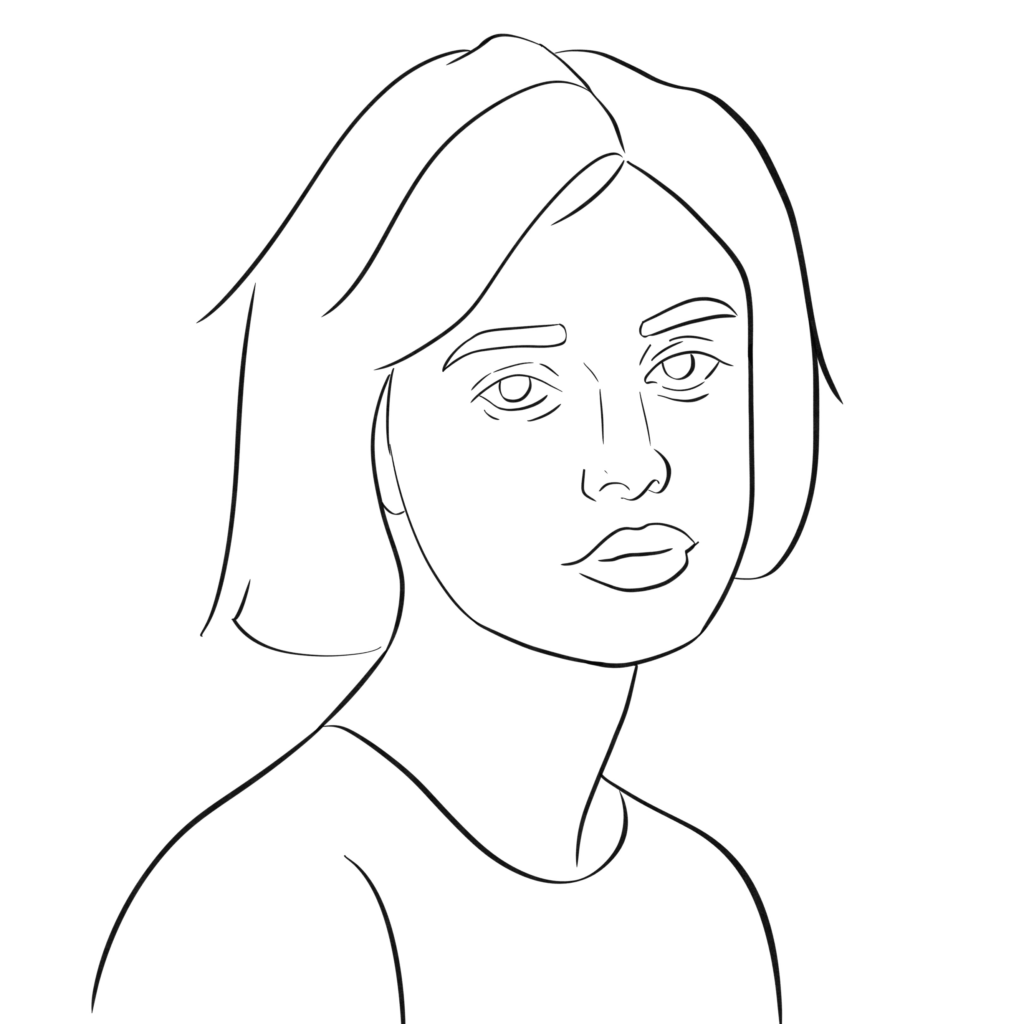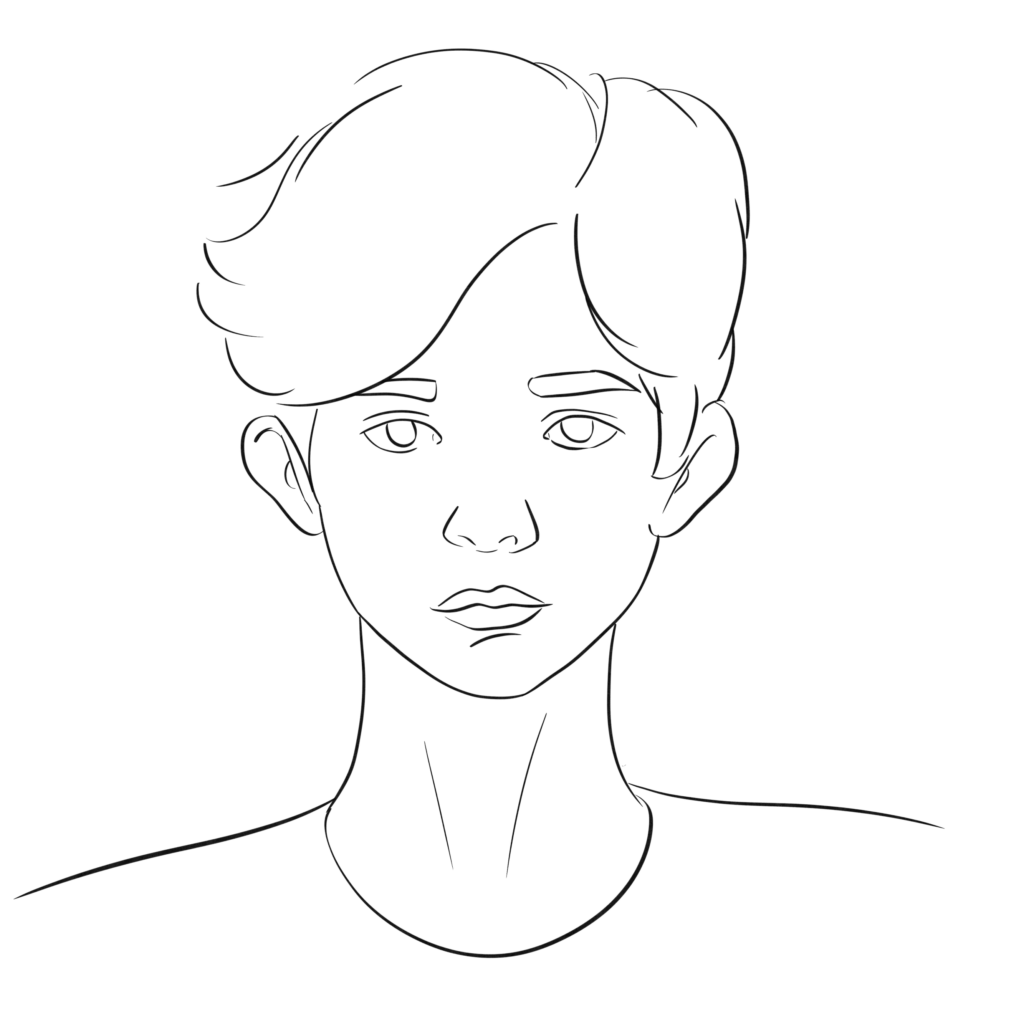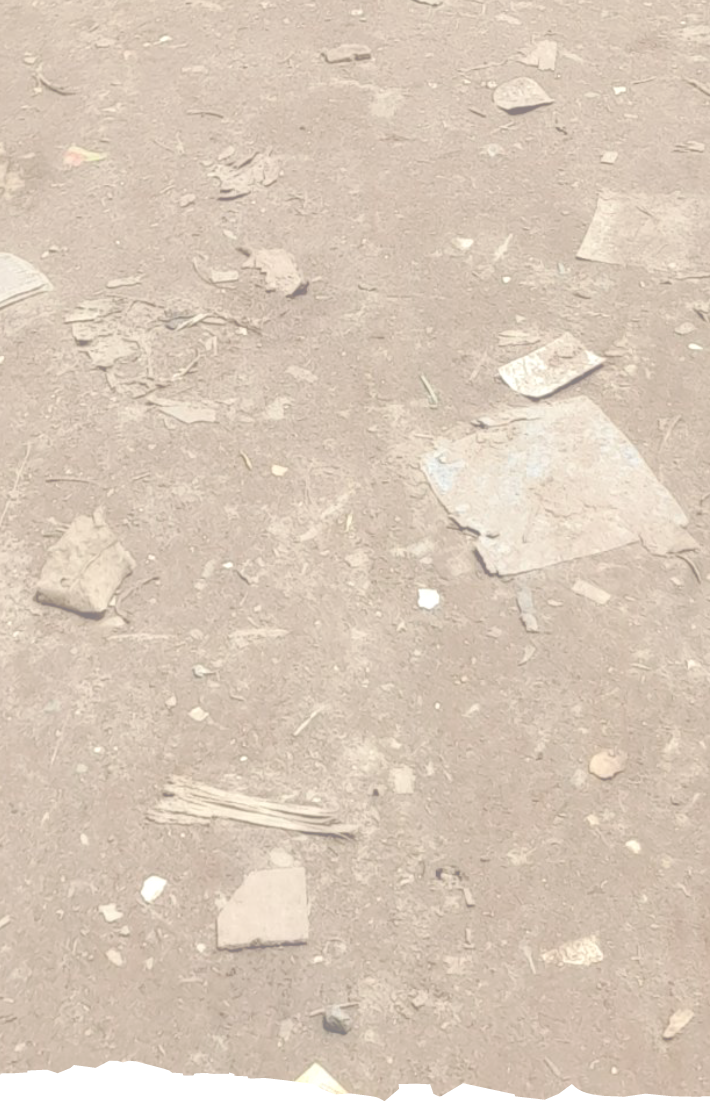
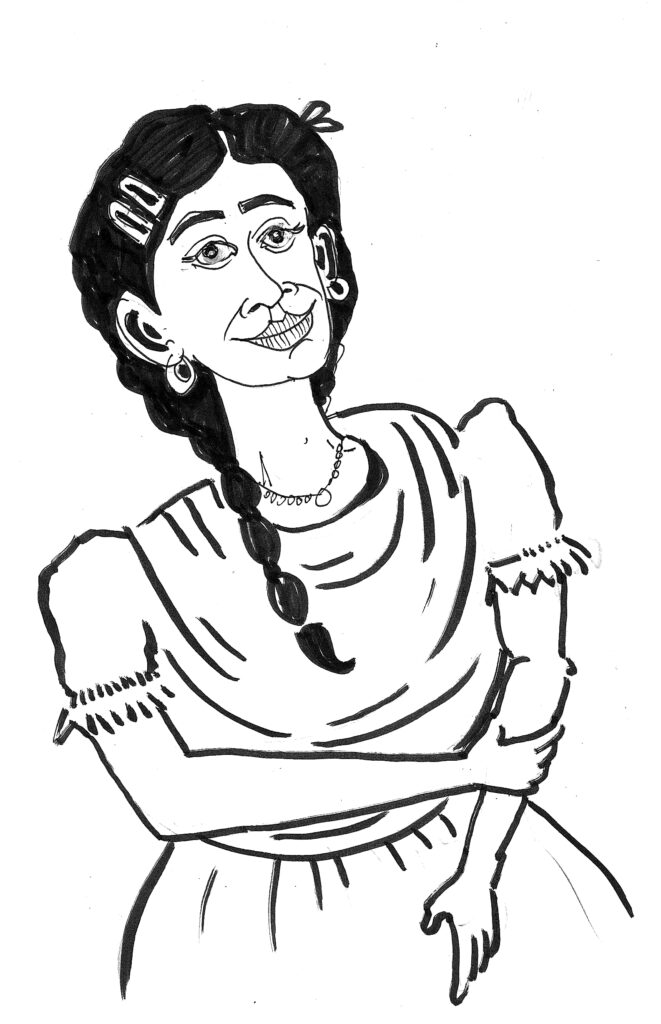
Asha, 17 year old girl

About Asha’s life
Asha lives in Hazaribagh with her mother, her stepfather and her 8-year-old brother. Her older brother and her sister are both married and live elsewhere.
Asha is getting married soon. Her wedding date will be soon after Eid. Asha met her future husband online and has known him for four months. She wants to marry as soon as possible so that she can leave home. Her stepfather is violent and abusive towards Asha and her mother. Asha’s sister is no longer in touch with the family, after eloping and moving to Rangpur. Asha sees marriage as the only way out of her current situation. Throughout the day, she chats with her future husband multiple times.
Asha was born and raised in Hazaribagh. She left school four years ago, at the age of 13 when the family relocated to Hemayetpur as the factory her stepfather was working in moved its premises.

Asha is soon to be married (aged 17)

I feel safe around the people at my factory. We care for one other, which has made a better working environment here. Being respected is important for me.
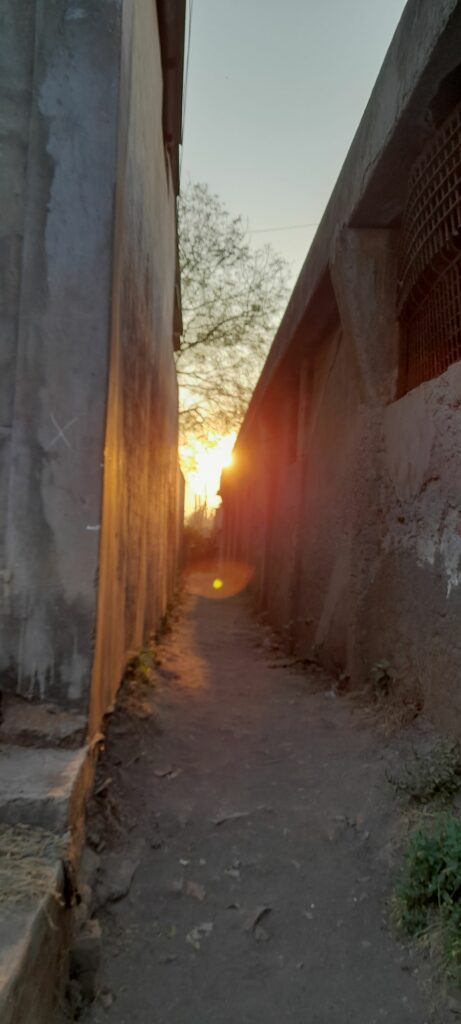
The location where a girl was raped and murdered
After the family relocated Asha did not attend school. Initially, this was for financial reasons but as time went on her studies were not re-prioritised despite the family’s circumstances improving.
The streets around her home are considered by Asha and her family to be dangerous and they are very contaminated and polluted with industrial and domestic waste. A girl was raped and murdered near Asha’s home and Asha is sexually harassed by young men on a daily basis.
Asha’s stepfather works at a fish scale modification factory and earns 13,000 BDT (US $118) per month. He also sells polyethene bags, which adds up to 5,000 BDT (US $45) a month to his income. Asha’s mother used to work as a maid but has not worked since the start of the covid pandemic.
Asha earns 8,000 BDT (US $73) a month and gives a portion of this to her mother. According to Asha, the family’s monthly expenses range between 20,000 BDT (US $182) and 22,000 BDT (US $200). Her brother’s monthly school fee is 700 BDT (US $6). The family spends up to 1,500 BDT (US $14) per month on Asha’s fathers treatment for tuberculosis and a similar amount on paan (chewing betal nut which is a stimulant similar to caffeine and is addictive) for her mother. As a result, they are unable to save any money.
“The water in the canal is so contaminated that it has turned black”
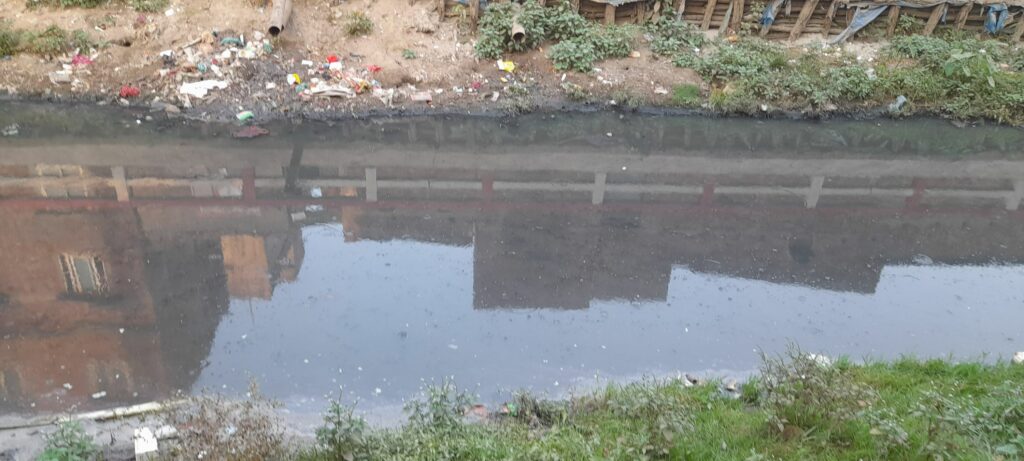
The polluted canal in Asha’s neighbourhood
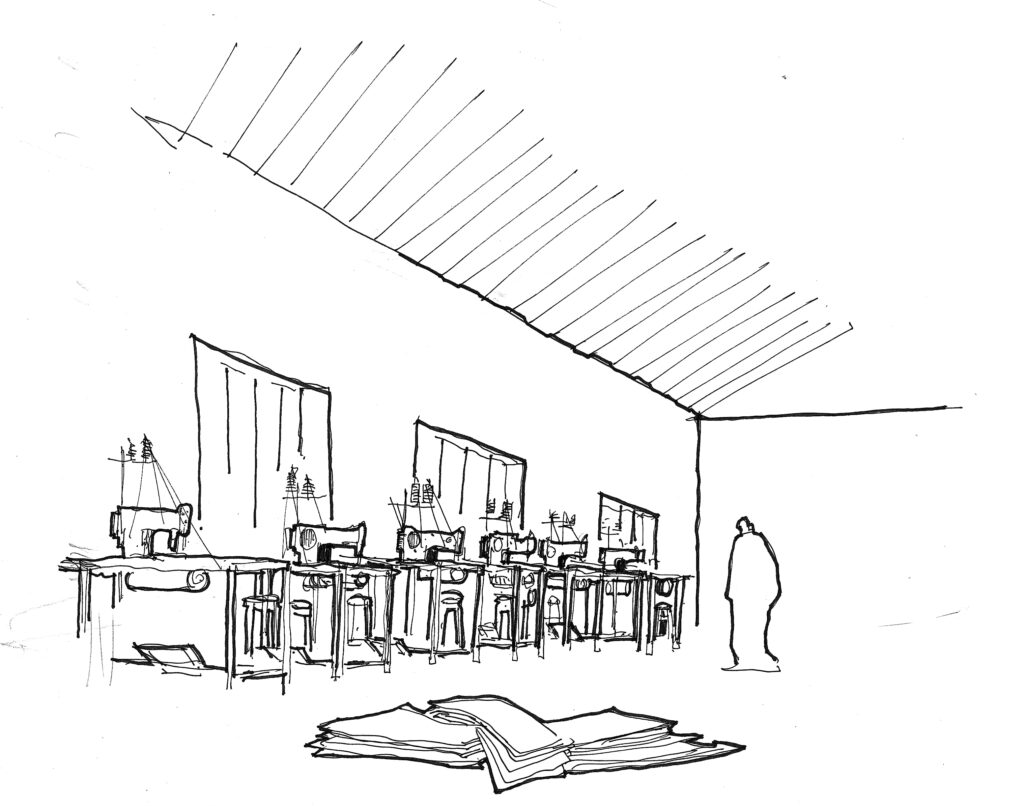
A row of sewing machines in the factory
Asha in her workplace
Asha works at a leather factory, sewing bags on an electric sewing machine. She has been working at this factory for six weeks. Previously she worked at another factory (a shoe manufacturing outfit in the same building) for one and a half years and she also worked, as a younger child, in other people’s homes. She finds her work tasks demanding in this new factory, but in some respects prefers her current job to the last one, as she is now paid more than she was before and in her previous factory she had to work a lot of overtime and she was frequently not paid on time.
On March 13 2023, Asha captured her experiences going from home to work and playing football on the rooftop of her building with friends. This day was fairly typical for Asha, but sometimes, instead of spending time with friends she goes to her stepfather’s factory to help him dry and sort the polythene that he sells or sometimes she helps her mother with housework. On other days she is so tired that she only naps after work.

Asha’s schedule changes during Ramadan. At this time, she does mandatory overtime for 15 days, and works until nine at night. During Ramdan workers only get one hour’s break for iftar (breaking the fast in the evening) on the overtime schedule.
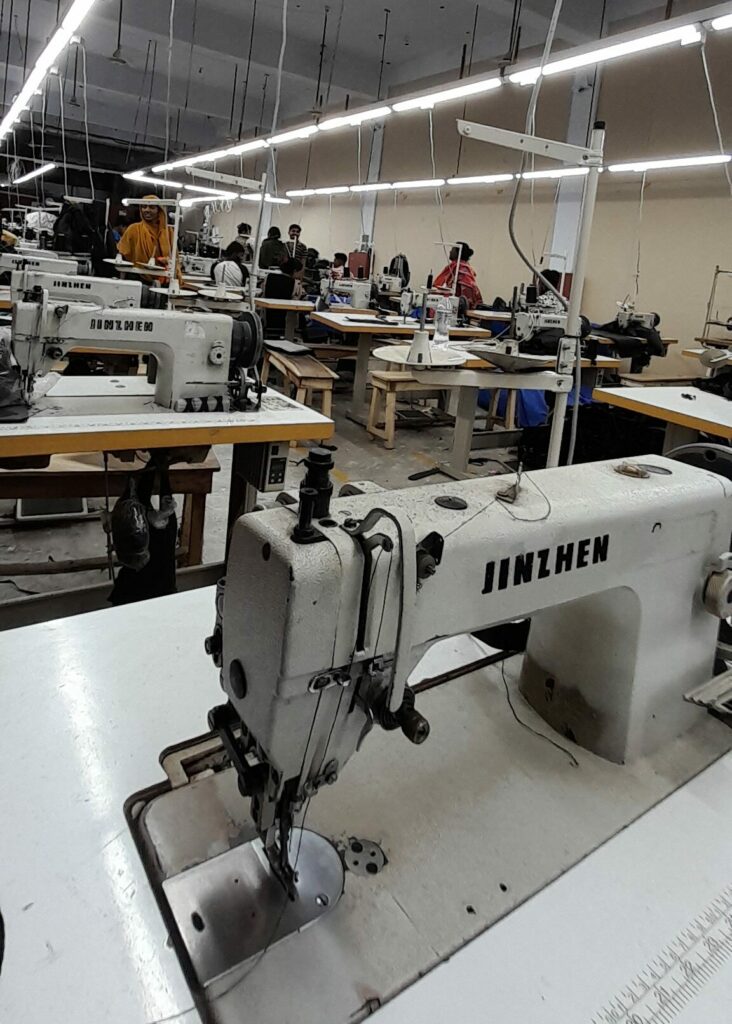
Sometimes there is a lot of pressure which makes me feel tired and irritated and nauseous. I have back pain after working for a long time. Sometimes I think if I could study again that would be better.
Asha’s day
Asha’s experience
I only enjoy my home when my stepfather is away. I like it best when he is not around, and I can do whatever I want, like watching my movies and TikTok videos on my phone.
Researcher’s experience
Asha starts work at the factory at 8 am and usually leaves home at 7.45 am. I arrived in the neighbourhood and called Asha to get her address but unfortunately, I couldn’t locate her house, so we decided to meet outside her factory at 8 o’clock.
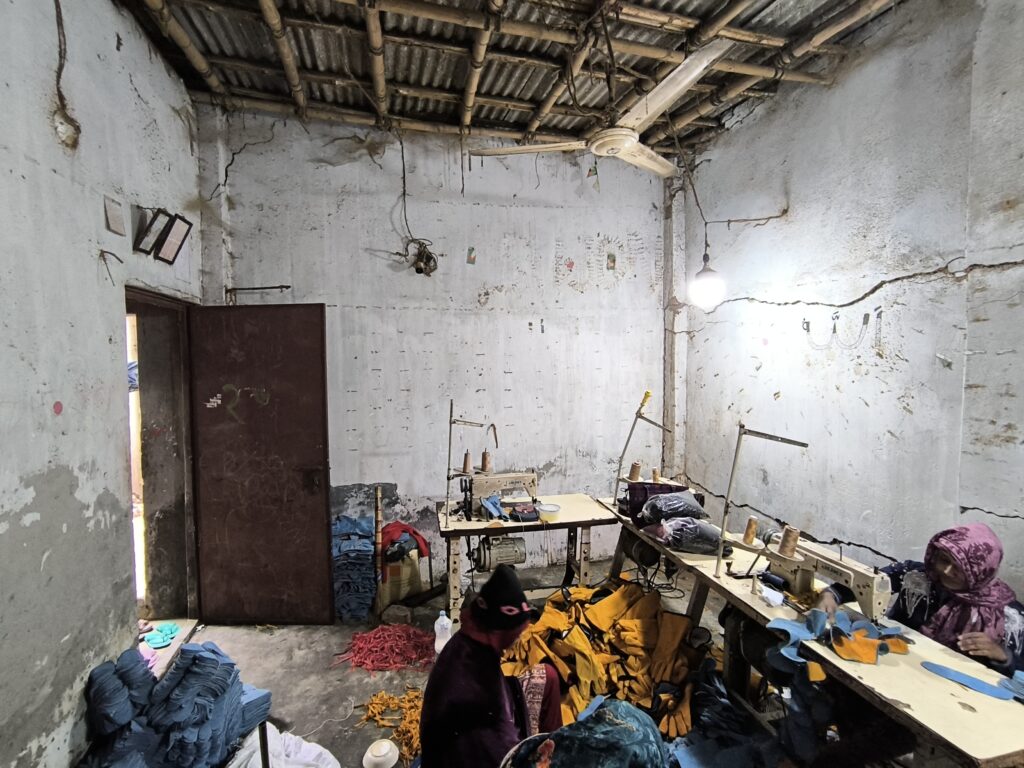
Workers movements being monitored by CCTV

Asha’s experience
The managers here are actually quite good, especially my supervisor. He asks about our wellbeing all the time and if we need any money. He helped me a lot to cope with the new environment when I came here. Also, I heard that we are going to be given sharees (traditional Bengali dress) today so I’m very excited.
I feel safe around the people of my factory. We care for one other and respect each other, which leads to a better working environment. Being respected is important for me.
Also, the work I do here is simpler than the other work I have done in previous jobs.
I have made a mistake with sewing straps. It’s making me feel irritated. Now I have to redo it. It’ll take some time which will affect my production goal.
Researcher’s experience
After some negotiation with her supervisor I am allowed to observe Asha at her work. Asha seems nervous whilst this conversation is going on and is relieved when it is agreed that I can stay.
Asha works in a large room with high ceilings. There are numerous fans, and the room seems neat and clean. Asha works sewing shoulder straps onto bags with a machine. She is stationed at one of 36 electric sewing machines which are arranged in three rows. Parts of bags are all around on the floor. Cameras are installed around the room. Around 45 people are working in the room. Around 70% of them seem to be adults and the workers are a mixture of men and women.
Asha seems gregarious in her workplace, and she chats with her colleagues while she is cleaning her machine and before she begins sewing. Asha is enthusiastic about a picnic that is planned for the workers on the coming Friday. All the women and girls are being given traditional dresses to wear to the picnic.
Asha sews 76 bag sections in two hours. During this period she makes a mistake and has to remake one strap. She worries that if the floor manager notices he will tell her off. She is also concerned that the mistake will slow down her output rate. Her floor manager checks in every two hours to see how many straps or bags she has stitched. Mistakes can lead to money being deducted from her, based on the time it takes to correct mistakes. If Asha makes several faulty or altered products, she takes half an hour less from her lunch break to make up the time.
Later in the morning Asha’s supervisor informs her that despite his efforts he has failed to get permission from higher-ups that I could stay with Asha. It seems that outsiders are not welcome within the factory. I am allowed to stay until lunchtime only. This seems to upset Asha.
Asha’s experience
I am hungry as I didn’t have the chance to eat anything before lunch break.
After eating I’m feeling better.
I’m watching TikTok videos and chatting with my friends on Facebook. These videos are so funny.
I am not feeling uncomfortable walking back to work as the road (between home and work) is now packed with people. But when I have to do overtime and make the journey home after 9-10 pm I feel scared.
Researcher’s experience
Asha goes home for lunch. Her house is about a 10-minute walk from her factory. It is fine during the day, but she feels unsafe and afraid when she needs to take this route home alone after working overtime, for example at nine or ten at night.
After eating Asha entertains herself on a phone and shows me a TikTok she and her friends have filmed.
She feels drowsy on her way back to the factory.
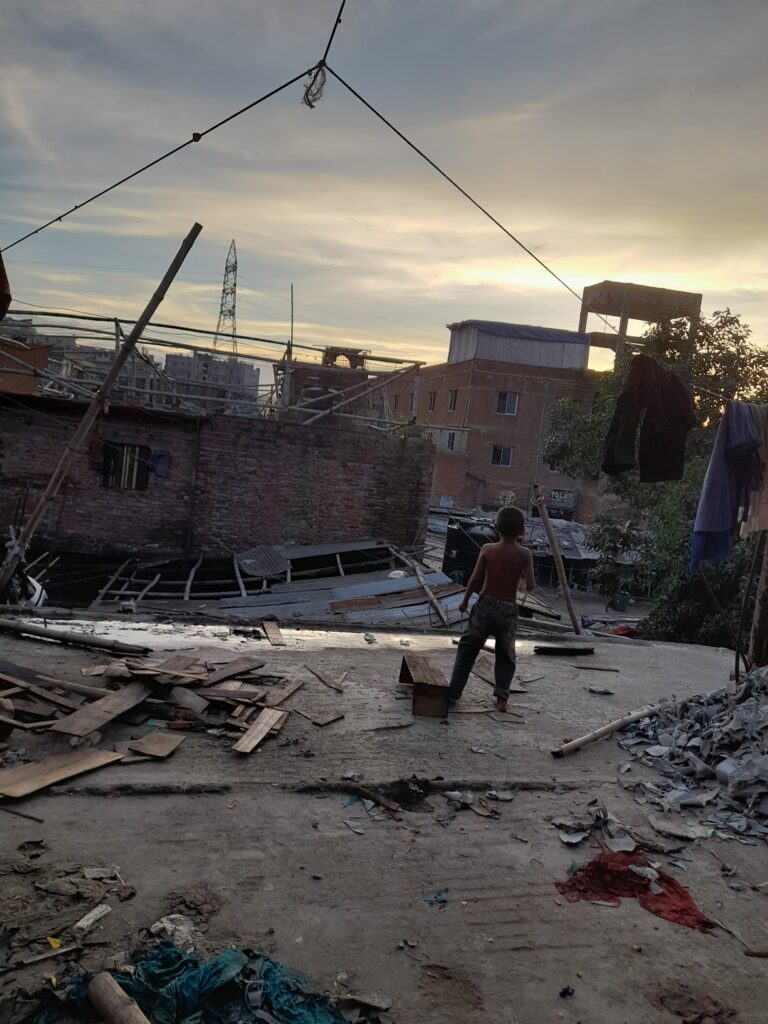
A rooftop

Asha’s experience
I’m done for the day. Now I’ll go home which is making me happy. I’ve reached today’s production goal. So I’m really feeling relieved.
Usually, I come home straight after work but sometimes I go to my friend’s house if I have some free time. Sometimes I visit Khalpar (a narrow riverside area near a major road through the district), mainly on Fridays. My stepfather works near there and I often go to help with his polythene-sorting work. Today, I walk through the area with the CLARISSA researcher. It’s a very dangerous area for women and girls. A girl was raped and murdered here. We moved house to get away from this place. It is dangerous at night. Men and boys take drugs there. We are harassed by some boys, which makes me very angry. I have to come to this area a lot. I feel uncomfortable and scared.
This is the place where a girl was raped. I always feel chills in my spine whenever I cross this road. I’m feeling uncomfortable here.
Researcher’s experience
At 5pm I pick up Asha and we head to ‘the Khalpar’, where she typically goes for a walk with her friends. This is a foul-smelling place. The water in the canal is so contaminated that it has turned black, but because there is no free space in this neighbourhood, ‘the Khalpar’ is renowned as the sole site where people can go for a walk.
Asha tells me about a girl who was raped and murdered nearby. After the murder, the families that lived very close by, including Asha’s own family, moved, and since it happened all the girls in the area have been told by their parents to stay well away. The crime scene is now under CCTV surveillance.
Young men harass me and Asha at this location, which was unnerving, and we get out of there as soon as we could.
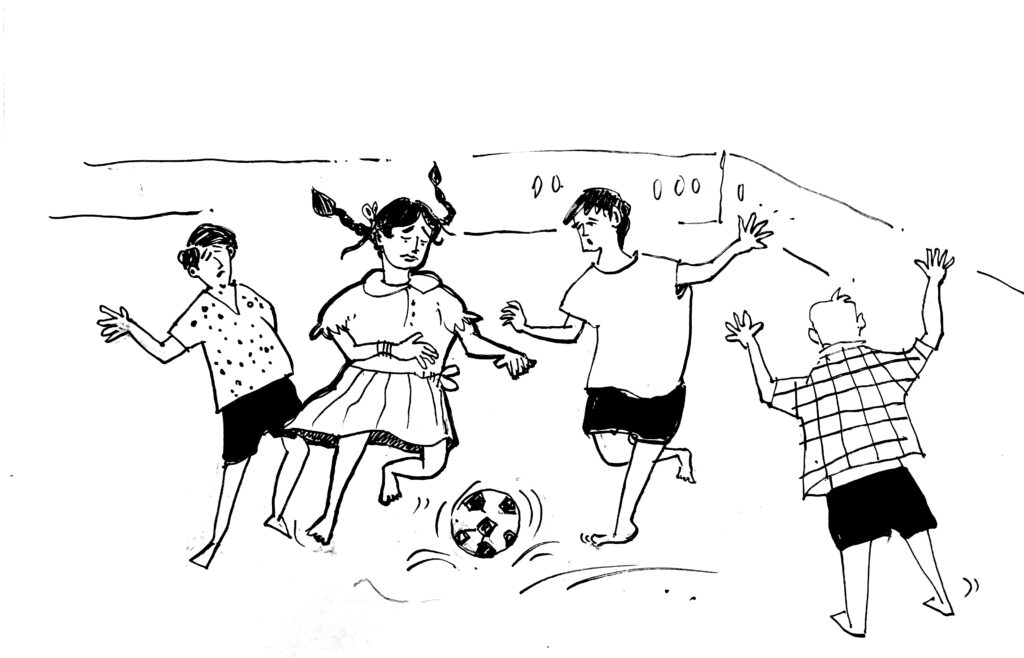
Playing football on the roof
Asha’s experience
Coming home after a long day always feels relaxing. Now I can rest for a bit so I’m feeling happy and relaxed.
The wind is feeling good. Usually I don’t stay up at the rooftop too long but as you’re with me it’s feeling safe. I’m actually very afraid of ghosts.
I love playing football. Usually I play with younger ones. I’m feeling amazing.
Researcher’s experience
Asha and her family live in a room on the ground floor of a three-story building. They use a shared open space for cooking, as well as two toilets shared by three families. The family’s dwelling has no access to natural light or to breeze and the lack of windows in the room makes it hot inside. The family’s furniture comprises a wardrobe, a cabinet, a meat rack, and a refrigerator. There is also a bicycle, which Asha’s younger brother rides. A three-antenna router is located in a corner of their room. Instead of watching TV, the family entertains themselves with two smartphones.
Three children are playing football on the rooftop. Asha and her friend join them and play football for a while. She appears to be cheerful and happy at this time. The rooftop is the only place where she can go for some peace and air. But she has to avoid the rooftop after 7pm when the landlord’s son uses the place to take drugs and drink alcohol with his gang.
Asha stays for a short time on the rooftop. She then spends some time talking with her fiancé. She then watches tiktok videos with her friend until 8 p.m.


